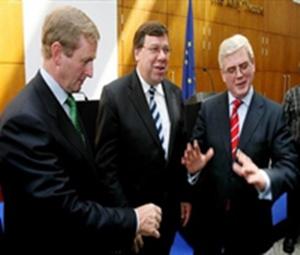Electorate now ready for a real alternative

The most important aspect of the most recent Irish Times poll was not the 32% for Labour, but the combined 45% for Fianna Fail and Fine Gael. By Eoin O Broin.
Individual polls tell you very little, it’s the overall trend that counts.
Since February 2009 Labour has scored from 20% to 25% in the MRBI polls. Their recent dramatic 10-point jump could either be an anomaly or an indicator of a significant surge.
Until we have a few more polls we just won’t know.
However the slump in support for Fianna Fail and Fine Gael has been coming for some time.
Historically the states two main parties held between 70% and 80% of the votes in local and general elections.
However, since the end of 2008, both election results and opinion polls have witnessed a steady decline in their combined share of the vote.
In the 2007 general election the Fianna Fail-Fine Gael vote was at 69%. Throw in the PDs and the total right-wing vote was 72%.
Opinion polls for the remainder of 2007 and pre-recession 2008 demonstrated a similar vote distribution.
Things started to change from the autumn of 2008.
In every poll from that date the combined FF-FG vote has slipped, from 61% in the November Irish Times poll, to 51% in the September 2009 Irish Times polls.
This decline was in evidence in the 2009 European parliament elections, with the combined FF-FG vote hitting an all time low of 53%.
And now, for the first time in the history of the state the total FF-FG vote has slipped below the 50% mark to a historic low of 45%.
So what does this general trend tell us?
Clearly it indicates a growing disillusionment with the two main parties. As unemployment rises and the recession continues to bite, the failed politics and policies of Fianna Fail and Fine Gael are cutting less and less ice with the electorate.
While Labour has been the chief beneficiary of this to date, Eamon Gilmore’s declared intention of entering coalition with Fine Gael will mean that many voters are sure to be disappointed by the compromises that will inevitably ensue.
The Labour Party's promise of One Ireland can not be delivered within the framework of Fine Gael's economic, fiscal and political conservatism.
Of course there is an alternative, and the Irish Time poll suggests, even if only tentatively, that the voting public may just be open to persuasion.
Fifty five percent of those polled by the Irish Times opted for parties other than Fianna Fail or Fine Gael.
The combined progressive vote is for the first time in polling history above 50%.
Could this be a sign that the electorate wants real change, and not just a cosmetic changing of the same old political guard?
There has never been a better time for the left to argue for a real alliance for change, an alliance that has no place for the failed politics or policies of Fianna Fail or Fine Gael.
Such an alliance should be about policies, not personalities. It should involve Labour, Sinn Fein and those smaller left parties who are interested in radical reform of institutions and policies.
Civil society groups and individuals should seek to define a role independent of but encouraging such a party political alliance and act as a social engine and guarantee of the agenda for change promised in advance of any general election.
This alliance for change should be based on the principle of equality. Its core aim should be the creation of a more economically, politically, culturally and affectively equal society.
Its understanding of equality should go further than equality of opportunity and focus on equality of outcome and condition, challenging structural and collective inequalities as well as individual ones.
It should offer a job creation plan to get 200,000 people back to work in 12 months; a universal health care system delivered on the basis of need and not ability to pay; real reform of the tax system making it both progressive and sustainable; substantial institutional and constitutional reform making politics more democratic and participative; a comprehensive plan anchored in new equality architecture to tackle the structural inequalities imbedded in our society; and the democratic advancement of all-Ireland economic and political reunification in the context of the full implementation of the Belfast Agreement.
It is too early to tell whether the Irish Times poll signals the beginning of a real shift in public opinion. However, there is no doubt that a real opportunity exists to make the argument that a better Ireland is possible.
